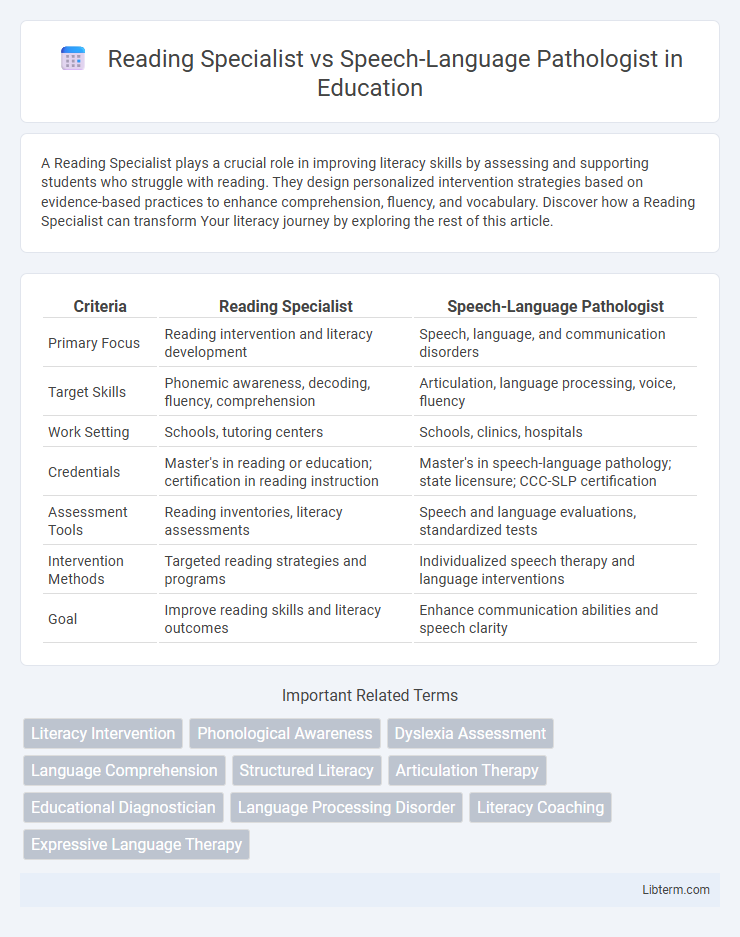A Reading Specialist plays a crucial role in improving literacy skills by assessing and supporting students who struggle with reading. They design personalized intervention strategies based on evidence-based practices to enhance comprehension, fluency, and vocabulary. Discover how a Reading Specialist can transform Your literacy journey by exploring the rest of this article.
Table of Comparison
| Criteria | Reading Specialist | Speech-Language Pathologist |
|---|---|---|
| Primary Focus | Reading intervention and literacy development | Speech, language, and communication disorders |
| Target Skills | Phonemic awareness, decoding, fluency, comprehension | Articulation, language processing, voice, fluency |
| Work Setting | Schools, tutoring centers | Schools, clinics, hospitals |
| Credentials | Master's in reading or education; certification in reading instruction | Master's in speech-language pathology; state licensure; CCC-SLP certification |
| Assessment Tools | Reading inventories, literacy assessments | Speech and language evaluations, standardized tests |
| Intervention Methods | Targeted reading strategies and programs | Individualized speech therapy and language interventions |
| Goal | Improve reading skills and literacy outcomes | Enhance communication abilities and speech clarity |
Understanding the Roles: Reading Specialist vs Speech-Language Pathologist
Reading specialists focus on diagnosing and treating reading difficulties, employing strategies to improve literacy skills such as phonemic awareness, decoding, and comprehension. Speech-language pathologists evaluate and treat communication disorders, targeting speech, language, and swallowing problems to enhance verbal and nonverbal communication abilities. Both roles require specialized training but address distinct aspects of language development and learning challenges in educational settings.
Education and Certification Requirements
Reading Specialists typically hold a master's degree in reading education or literacy and require state certification in reading instruction, often including specialized training in phonics, comprehension strategies, and assessment techniques. Speech-Language Pathologists must earn a master's degree in speech-language pathology, complete supervised clinical hours, and obtain certification from the American Speech-Language-Hearing Association (ASHA) along with state licensure. Both professions demand continuing education to maintain credentials and stay current with advances in literacy and communication disorders.
Core Responsibilities and Daily Tasks
A Reading Specialist focuses on assessing and improving students' literacy skills through targeted instruction and intervention, utilizing phonics, comprehension strategies, and individualized reading plans. Speech-Language Pathologists evaluate and treat communication disorders by developing therapy plans that address speech, language, voice, and fluency challenges. Both professionals collaborate with educators and families, but Reading Specialists primarily enhance academic reading outcomes, whereas Speech-Language Pathologists address broader oral communication and language development needs.
Areas of Expertise and Intervention Focus
Reading Specialists focus on diagnosing and remediating reading difficulties, utilizing strategies for phonics, comprehension, fluency, and vocabulary development in students with diverse learning needs. Speech-Language Pathologists specialize in assessing and treating communication disorders, including articulation, language processing, voice, and social communication across pediatric and adult populations. Intervention for Reading Specialists targets literacy improvement through evidence-based reading programs, while Speech-Language Pathologists employ tailored therapy to enhance speech clarity, language acquisition, and effective communication skills.
Assessment Techniques and Tools Used
Reading Specialists utilize tools such as running records, miscue analysis, and standardized reading assessments like the DIBELS or the Woodcock-Johnson to evaluate decoding, fluency, and comprehension skills in students. Speech-Language Pathologists employ a range of assessment techniques, including articulation tests, language sampling, and standardized tools like the Clinical Evaluation of Language Fundamentals (CELF) and Goldman-Fristoe Test of Articulation, to diagnose speech and language disorders. Both professionals rely on data-driven approaches but target distinct areas: Reading Specialists focus on literacy development, while Speech-Language Pathologists assess oral communication abilities.
Collaboration with Teachers and Parents
Reading specialists collaborate closely with teachers and parents to develop targeted literacy interventions, sharing progress data and instructional strategies that support students' reading growth. Speech-language pathologists work with educators and families to address communication disorders by creating individualized treatment plans and providing guidance on language development techniques. Both professionals emphasize teamwork to ensure consistent support, enhance student outcomes, and integrate therapeutic goals within academic and home environments.
Common Settings for Practice
Reading Specialists primarily work in elementary and middle schools, supporting students with literacy challenges through targeted interventions and individualized instruction. Speech-Language Pathologists (SLPs) practice across diverse settings including schools, hospitals, and private clinics, addressing communication disorders in children and adults. Both professionals often collaborate in educational environments to enhance language development and literacy outcomes.
Impact on Student Literacy and Communication
Reading Specialists enhance student literacy by implementing evidence-based reading interventions, targeting decoding, fluency, and comprehension skills to improve overall academic achievement. Speech-Language Pathologists focus on communication by diagnosing and treating speech, language, and swallowing disorders, facilitating effective verbal interaction and social participation. Both professionals collaborate to address overlapping issues in language development, significantly impacting students' literacy acquisition and oral communication abilities.
When to Refer: Identifying Student Needs
Refer a student to a Reading Specialist when they exhibit persistent reading difficulties such as decoding problems, fluency issues, or comprehension challenges despite targeted classroom interventions. A Speech-Language Pathologist is appropriate for students demonstrating speech sound disorders, language delays, or social communication deficits impacting their ability to express or understand language. Early identification through screening assessments and teacher observations is crucial to determine whether literacy support or speech therapy best addresses the student's unique learning needs.
Choosing the Right Support for Your Child
Choosing the right support for your child depends on their specific needs: Reading Specialists focus on improving reading skills, fluency, and comprehension through targeted interventions, while Speech-Language Pathologists address communication disorders, including speech, language, and swallowing difficulties. Evaluating your child's challenges with a comprehensive assessment from educators or healthcare professionals helps determine whether literacy support or speech therapy is the most suitable approach. Collaborating with both specialists can provide a holistic strategy to foster your child's academic and communicative development.
Reading Specialist Infographic

 libterm.com
libterm.com